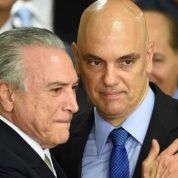The moment Alexandre de Moraes was named as justice minister in the coup government led by de facto President Michel Temer, social movements knew what was in store for them.

RELATED:
Brazilian Police Storm MST School Firing Live Rounds
Moraes, who bares a striking resemblance to Superman's arch nemesis Lex Luthor, is well known for his propensity to resort to repression. Valor magazine even named him “Temer's pitbull.”
With the police assault on the National School of the Landless Workers Movement, Brazil's largest social movement, it seems the worst fears concerning de Moraes have come true.
Before becoming justice minister, he served as secretary for security for the right-wing government of the state of Sao Paulo. In that capacity, de Moraes was effectively the head of the state's Military Police, a body that has faced regular accusations of human rights abuses, including accusations of extrajudicial killings.
As secretary for security, he oversaw several brutal crackdowns on social protest, including an incident on Jan. 13, 2016 that was widely condemned for its excessive use of police force.
During that incident, police violently broke up the peaceful protest using tear gas, stun grenades, and repressive force. Without any provocations whatsoever, police would come to use 49 stun grenades against demonstrators in the span of only six minutes, or one every seven seconds.
Camila Marques, a lawyer with the Article 19 human rights organization, said police actions on that day were “illegal and abusive.”
Moraes, then Sao Paulo's chief of security, denied the police committed any abuses and said the protest organizers were to blame for the violence.
RELATED:
Brazil: Police Used Infiltrators to Detain Peaceful Protestors
Police violence against demonstrators in Sao Paulo during protests in early 2016 was so severe that Atila Roque, executive director of Amnesty International Brazil, was forced to condemn the repression.
"The police surrounded the protest and attacked the demonstrators ... The violent suppression and disruption of peaceful protests violates the Constitution,” said Roque in a statement at the time.
“It is unfortunate that, instead of promoting a policy debate on the issue of public transport, the demand of the demonstrations, the State responds to youth with bombs and bullets, affronting the right to democracy and protest,” added Roque.
It was also de Moraes who introduced the use of Israeli-made armored vehicles during police actions against protests.
An investigation by Globo TV found that the Sao Paulo Military Police were responsible for one out of every four killings in 2015, a year that coincides with Moraes' leadership as head of security. That year the Military Police killed 532 people, more than the 495 killed in 2006 when there was a virtual war between organized crime groups and the police.
But his dark history goes further than that: he also provided legal representation to Eduardo Cunha, the now disgraced former head of the lower house of Congress. He also represented a company accused of running a money laundering scheme on behalf of the First Command of the Capital, a notorious paramilitary organized crime group.
It would now seem de Moraes has brought his repressive model to his post as justice minister.
In response to criticisms of his heavy-handed approach, in an interview with Folha de S. Paulo in May of this year, de Moraes said that he was merely complying with the law and the constitution.
Moraes alleged that his critics were defending “total anarchy” before making a slippery slope argument.
“Today people break into a public building, tomorrow they invade, as they invaded, the Legislative Assembly, then Palace of Justice, later (they will invade) the house of anyone,” argued de Moraes.
That wouldn't be the only time he would attempt to link social protest with crime. Responding to protests against efforts by conservative politicians to oust Rousseff, de Moraes said the demonstrations were “acts of guerrilla (groups).”
“I would not say they were demonstrations. They were acts that do not constitute a demonstration because they had no demands They, instead, wanted to disrupt the city. They behaved as acts of guerrilla (groups). We will identify (the people responsible), because there is a criminal attitude including endangering others,” de Moraes said shortly before being named justice minister.
RELATED:
Brazil Coup Govt Unleashes Wave of Repression on Protesters
After the parliamentary coup against Rousseff was consummated in September, mass protests broke out all over Brazil, but particularly in Sao Paulo.
At the conclusion of the peaceful protest in the city of Sao Paulo on Sept. 4, police indiscriminately attacked the crowd with tear gas as people began to disperse and demonstrators headed for the metro entrances. A journalist with BBC Brazil was also attacked despite reportedly identifying himself as a member of the press.
Similar scenes played out during other protests against the coup in the weeks to follow. Brazilian police even resorted to preemptively detaining protesters and using infiltrators to facilitate their arrests ahead of one protest.
It is worth noting that due to Temer's reorganization of the cabinet, the ministry of human rights ceased to exist and is now subsumed into the ministry of justice, which de Moraes now heads.
News that a school run by Brazil’s Landless Workers' Movement, or MST, was raided by police officers despite the lack of a warrant marks an escalation of the criminalization of social movements.
That raid reportedly formed part of a larger police operation in three states to detain leaders from the MST.
The Temer government is aware that the biggest obstacles to the implementation of its neoliberal program are social movements, making them the illegitimate government's biggest nemesis.
An undemocratic government will always act in authoritarian manner.